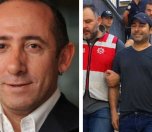Click to read the article in Turkish
Following the release order for the 21 journalists out of 29 journalists and writers including Atilla Taş and Murat Aksoy who were standing trial over investigation launched following the July 15 coup attempt upon accusations of being affiliated with the Fethullahist Terrorist Organization (FETÖ) on March 31, Friday, another detention order has been issued. The journalists have not been released.
İbrahim Loğasdağı, the President of the court passing the verdict in the trial held before İstanbul 25th High Criminal Court of Justice, had ruled that Abdullah Kılıç, Ahmet Memiş, Ali Akkuş, Atilla Taş, Bayram Kaya, Bünyemin Köseli, Cemal Azmi Kalyoncu, Cihan Acar, Cuma Ulus, Gökçe Fırat Çulhaoğlu, Habip Güler, Halil İbrahim Balta, Hanım Büşra Erdal, Hüseyin Aydın, Muhammet Sait Kuloğlu, Murat Aksoy, Mustafa Erkan Acar, Oğuz Usluer, Seyid Kılıç, Yakup Çetin and Yetkin Yıldız be released.
Yet İstanbul Chief Public Prosecutor's Office has launched an investigation into Atilla Taş, Ali Akkuş, Hüseyin Aydın, Murat Aksoy, Mustafa Erkan Acar, Seyid Kılıç and Yetkin Yıldız suspecting a connection with the coup attempt on July 15.
As a part of this new investigation, a detention order has been issued for seven people on charge of "attempting to suspend the constitutional order" and "attempting to overthrow the Government of the Republic of Turkey". The reason for the detention order has been declared as "the evidence against the suspects, the nature of the crime and suspicion of an attempt to escape".
A detention order had already been issued for Gökçe Fırat Çulhaoğlu, Yakup Çetin, Bünyamin Köseli, Cihan Acar, Abdullah Kılıç and Oğuz Usluer as a part of this investigation. Including the last detention order, 13 of the 21 suspects, supposed to be released on March 31, are currently subjected to a new investigation.
In addition, the prosecutor had objected to the decision of İstanbul 25th High Criminal Court of Justice ordering the release of had Hanım Büşra Erdal, Ahmet Memiş, Bayram Kaya, Cemal Azmi Kalyoncu, Cuma Ulus, Habib Güler, Halil İbrahim Balta and Muhammet Said Kuloğlu in the trial regarding the "Media organization of FETÖ". İstanbul 26th High Criminal Court had sustained the objection.
Prof. Dr. Yaman Akdeniz, the attorney representing Atilla Taş and Murat Aksoy had announced on Twitter on April 1, that he did not know where and whether the two journalists were in custody or arrested.
What Happened?
On August 30, 2016, İstanbul Chief Public Prosecutor's Office had issued a detention order for 35 people including several academics and journalists as part of the investigation launched into the FETÖ following the coup attempt on July 15. 27 of the 35 detainees were arrested later. The journalists and writers arrested on different days, had been waiting to stand trial for eight days.
The state-run Anadolu News Agency had reported on the detention order for the journalists and writers under "Operation against the media organization of FETÖ".
The suspects of the trial are employers, owners and writers of Millet daily, Cihan News Agency, Zaman daily, Meydan daily, Yeni Hayat daily, Bugün daily and Rota News, Samanyolu News websites.
There are 29 suspects standing trial 26 of whom are arrested. Warrant has been issued to take two suspects forcibly to testify.
Said Sefa faces 22,5 and the other 28 suspects face 15 years in prison each.
The names of those who stood trial are as follows:
Abdullah Kılıç, Ahmet Memiş, Ali Akkuş, Atilla Taş, Bayram Kaya, Bülent Ceyhan, Bünyemin Köseli, Cemal Azmi Kalyoncu, Cihan Acar, Cuma Ulus, Davut Aydın, Emre Soncan, Gökçe Fırat Çulhaoğlu, Habip Güler, Halil İbrahim Balta, Hanım Büşra Erdal, Hüseyin Aydın, Muhammet Sait Kuloğlu, Muhterem Tanık, Murat Aksoy, Mustafa Erkan Acar, Mutlu Çölgeçen, Oğuz Usluer, Said Sefa, Seyid Kılıç, Ufuk Şanlı, Ünal Tanık, Yakup Çetin, Yetkin Yıldız. (AS/DG)












